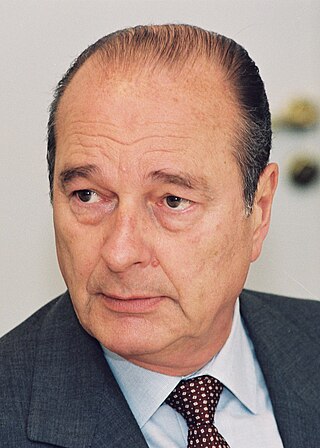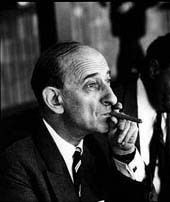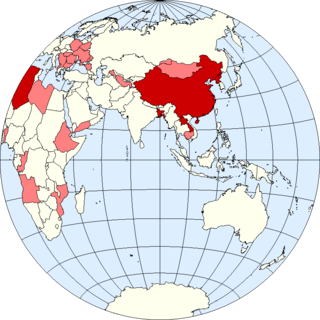
Ronald Tiersky is the Joseph B. Eastman Professor of Political Science Emeritus at Amherst College, Amherst, Massachusetts. [1]

Ronald Tiersky is the Joseph B. Eastman Professor of Political Science Emeritus at Amherst College, Amherst, Massachusetts. [1]
Tiersky taught political science and European Studies at Amherst for four decades. [2] During 1980-82 he was Director of the Johns Hopkins School of Advanced International Studies center in Bologna, Italy. [3] He was associated over the years with the Paris Centre d’études des relations internationales (CERI).
Tiersky is a member of the Council on Foreign Relations, [4] and he is the founding editor and general editor of the "Europe Today" series at Rowman & Littlefield publishers. [5]
Raised in Chicago, IL, Tiersky did his B.A. at the University of Illinois (Champaign-Urbana) in history. He did his M.A. (1971) and Ph, D. (1972), in Political Science, at Columbia University.
He lived in Paris, France 1969-1973 researching his dissertation and first book, on the French Communist Party, where his mentors were Profs. Raymond Aron, Pierre Hassner, and Annie Kriegel.
Tiersky has written widely on European politics, American foreign policy and international politics.
Books authored
Books edited
His articles and editorials have appeared in Foreign Affairs , [6] The New York Times , [7] the New York Review of Books , [8] the International Herald Tribune , Le Monde , [9] Le Point , Libération , [10] and RealClearWorld . [11]

François Marie Adrien Maurice Mitterrand was President of France from 1981 to 1995, the longest holder of that position in the history of France. As First Secretary of the Socialist Party, he was the first left-wing politician to assume the presidency under the Fifth Republic.

Jacques René Chirac was a French politician who served as President of France from 1995 to 2007. Chirac was previously Prime Minister of France from 1974 to 1976 and from 1986 to 1988, as well as Mayor of Paris from 1977 to 1995.

Valéry René Marie Georges Giscard d'Estaing, also known as Giscard or VGE, was a French politician who served as President of France from 1974 to 1981.

Le Monde is a French daily afternoon newspaper. It is the main publication of Le Monde Group and reported an average circulation of 323,039 copies per issue in 2009, about 40,000 of which were sold abroad. It has had its own website since 19 December 1995, and is often the only French newspaper easily obtainable in non-French-speaking countries. It is considered one of the French newspapers of record, along with Libération, and Le Figaro. It should not be confused with the monthly publication Le Monde diplomatique, of which Le Monde has 51% ownership, but which is editorially independent. A Reuters Institute poll in 2021 in France found that "Le Monde is the most trusted national newspaper".

Michel Rocard was a French politician and a member of the Socialist Party (PS). He served as Prime Minister under François Mitterrand from 1988 to 1991 during which he created the Revenu minimum d'insertion (RMI), a social minimum welfare program for indigents, and achieved the Matignon Accords regarding the status of New Caledonia. He was a member of the European Parliament, and was strongly involved in European policies until 2009. In 2007, he joined a Commission under the authority of Nicolas Sarkozy's Minister of Education, Xavier Darcos.

Raymond Claude Ferdinand Aron was a French philosopher, sociologist, political scientist, historian and journalist, one of France's most prominent thinkers of the 20th century.

The Rally for the Republic, was a Gaullist and conservative political party in France. Originating from the Union of Democrats for the Republic (UDR), it was founded by Jacques Chirac in 1976 and presented itself as the heir of Gaullist politics. On 21 September 2002, the RPR was merged into the Union for the Presidential Majority, later renamed the Union for a Popular Movement (UMP).

People's republic is an official title, commonly used by some current and former communist states as well as other left-wing governments. It is mainly associated with soviet republics, socialist states following people's democracy, sovereign states with a democratic-republican constitution usually mentioning socialism, as well as some countries that do not fit into any of these categories.

Jacques José Mardoché Attali is a French economic and social theorist, writer, political adviser and senior civil servant, who served as a counselor to President François Mitterrand from 1981 to 1991, and was the first head of the European Bank for Reconstruction and Development from 1991 to 1993. In 1997, upon the request of education minister Claude Allègre, he proposed a reform of the higher education degrees system. From 2008 to 2010, he led the government committee on how to ignite the growth of the French economy, under President Nicolas Sarkozy.

In political science, rollback is the strategy of forcing a change in the major policies of a state, usually by replacing its ruling regime. It contrasts with containment, which means preventing the expansion of that state; and with détente, which means a working relationship with that state. Most of the discussions of rollback in the scholarly literature deal with United States foreign policy toward communist countries during the Cold War. The rollback strategy was tried and was not successful in Korea in 1950 and in Cuba in 1961, but it was successful in Grenada in 1983. The political leadership of the United States discussed the use of rollback during the East German uprising of 1953 and the Hungarian Revolution of 1956, but decided against it to avoid the risk of Soviet intervention or a major war.

The Black Book of Communism: Crimes, Terror, Repression is a 1997 book by Stéphane Courtois, Andrzej Paczkowski, Nicolas Werth, Jean-Louis Margolin, and several other European academics documenting a history of political repression by communist states, including genocides, extrajudicial executions, deportations, and deaths in labor camps and artificially created famines. The book was originally published in France as Le Livre noir du communisme: Crimes, terreur, répression by Éditions Robert Laffont. In the United States, it was published by Harvard University Press, with a foreword by Martin Malia. The German edition, published by Piper Verlag, includes a chapter written by Joachim Gauck. The introduction was written by Courtois. Historian François Furet was originally slated to write the introduction, but he died before being able to do so.

Jacques Cheminade is a French-Argentinian political activist. He is the head of Solidarity and Progress, the French arm of the LaRouche movement, and has thrice run for President of France.
Stanley Hoffmann was a French political scientist and the Paul and Catherine Buttenwieser University Professor at Harvard University, specializing in French politics and society, European politics, U.S. foreign policy, and international relations.
Frédéric Bozo is a professor at the University of Paris III: Sorbonne Nouvelle, where he teaches contemporary history and international relations. He is also a Senior Research Associate at the Institut français des relations internationales (IFRI) where his focus is on Atlantic and European security issues. His prior teaching positions include the Institut d’Etudes Politiques de Paris (1989–1992), the University of Paris X-Nanterre (1992–1994) and the University of Marne-la-Vallée (1994–1998). He is also a member of the Centre de recherche sur l’histoire du monde Atlantique and of the Groupe français pour l’histoire de l’arme nucléaire.

Paul G. Kengor is an author and professor of political science at Grove City College, a private Christian liberal arts college in Grove City, Pennsylvania. He is the executive director of Institute for Faith and Freedom, a Grove City College conservative think tank/policy center. He is also a visiting fellow at the Hoover Institution on War, Revolution, and Peace, a conservative think tank at Stanford University.
The foreign policy of the François Mitterrand administration was the foreign policy of France under François Mitterrand that emphasized European unity and the preservation of France's special relationships with its former colonies in the face of "Anglo-Saxon influence." He served as President of France for two 7-year terms, from 1981 to 1995. A part of the enacted policies was formulated in the Socialist Party's 110 Propositions for France, the electoral program for the 1981 presidential election. He had a warm and effective relationship with the conservative German Chancellor Helmut Kohl. They promoted French-German bilateralism in Europe and strengthened military cooperation between the two countries. There was a high Level of continuity with the policies of Charles de Gaulle especially in terms of nationalism, NATO, nuclear weapons, French Africa, and distrust of the British and Americans.

France–Russia relations, also known as Franco-Russian relations or Russo-French relations, have seldom been friendly.

The Socialist Party is a French centre-left and social-democratic political party. It holds pro-European views. The PS was for decades the largest party of the "French Left" and used to be one of the two major political parties in the French Fifth Republic, along with The Republicans. It replaced the earlier French Section of the Workers' International in 1969 and is currently led by First Secretary Olivier Faure. The PS is a member of the Party of European Socialists, Progressive Alliance and Socialist International.
The seminal use of cordon sanitaire as a metaphor for ideological containment referred to "the system of alliances instituted by France in post-World War I Europe that stretched from Finland to the Balkans" and which "completely ringed Germany and sealed off Russia from Western Europe, thereby isolating the two politically 'diseased' nations of Europe."